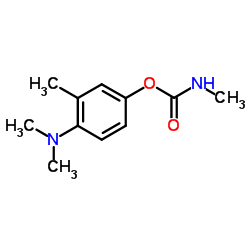Human term placental lipoxygenase-mediated N-demethylation of phenothiazines and insecticides in the presence of linoleic acid.
C G Hover, A P Kulkarni
文献索引:Placenta 21(7) , 646-53, (2000)
全文:HTML全文
摘要
This study investigated the hypothesis that human term placental lipoxygenase (HTPLO) and soybean lipoxygenase (SLO) are capable of mediating N-demethylation of selected phenothiazines and insecticides in the presence of linoleic acid (LA). In addition to being LA dependent, the N-demethylation reaction mediated by HTPLO and SLO was limited by incubation time, pH of the medium, concentration of the enzyme and the substrate. Using Nash reagent to monitor formaldehyde production, the specific activity for LA-dependent N-demethylation of chlorpromazine, a model phenothiazine, was determined to be 1.7+/-0.3 nmoles/min/mg HTPLO. Besides chlorpromazine, N-demethylation of promazine, promethazine and trimeprazine was also observed. The insecticide, aminocarb, displayed a specific activity of 2.2+/-0.3 nmoles/min/mg HTPLO for N-demethylation. Other insecticides, namely chlordimeform, dicrotophos and zectran, were oxidized in a similar manner. As compared with HTPLO, the rates of N-demethylation of phenothiazines and insecticides mediated by SLO were higher. Classical inhibitors of lipoxygenase, as well as antioxidants and free radical scavengers, caused a dose-dependent reduction in the production of formaldehyde from chlorpromazine and aminocarb by HTPLO. These results clearly demonstrate the ability of polyunsaturated free fatty acids to support N-demethylation of xenobiotics via the lipoxygenase pathway.Copyright 2000 Harcourt Publishers Ltd.
相关化合物
| 结构式 | 名称/CAS号 | 分子式 | 全部文献 |
|---|---|---|---|
 |
灭害威
CAS:2032-59-9 |
C11H16N2O2 |
|
Mining biologically-active molecules for inhibitors of fatty...
2009-01-01 [Bioorg. Med. Chem. Lett. 19 , 6793-6, (2009)] |
|
Influence of formulation properties on droplet spectra and s...
1985-07-01 [J. Environ. Sci. Health B 20(2) , 167-86, (1985)] |
|
Photolysis of pesticides: influence of epicuticular waxes fr...
2001-06-01 [Pest Manag. Sci. 57(6) , 522-6, (2001)] |
|
Measurement of aminocarb in long-distance drift following ae...
1989-01-01 [Bull. Environ. Contam. Toxicol. 42(1) , 37-44, (1989)] |
|
The sorptive capacity of an aquatic macrophyte for the pesti...
1985-04-01 [J. Environ. Sci. Health B 20(2) , 263-73, (1985)] |